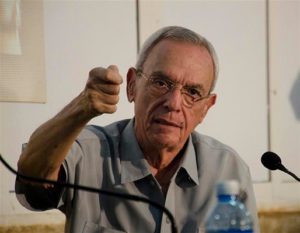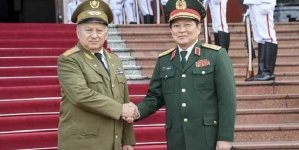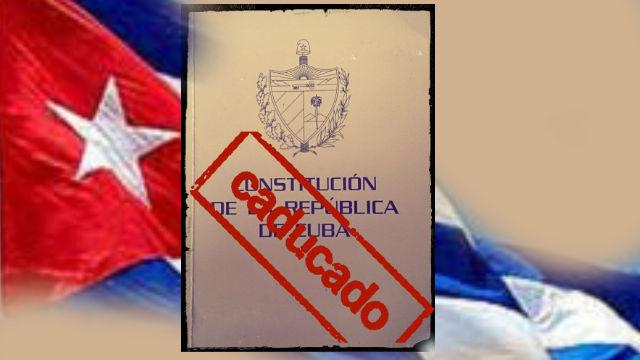 (OPINIÓN) SIN NINGÚN RESPALDO EN LA “NUEVA CONSTITUCIÓN” EL PROTAGONISMO DE LAS EMPRESAS MILITARES EN CUBA.
(OPINIÓN) SIN NINGÚN RESPALDO EN LA “NUEVA CONSTITUCIÓN” EL PROTAGONISMO DE LAS EMPRESAS MILITARES EN CUBA.
No cabe duda de que el principal actor económico en Cuba son las Fuerzas Armadas Revolucionarias (FAR). Oficialmente no se divulgan datos al respecto, pero algunos expertos calculan que las empresas militares ya representan alrededor del 70% de la economía nacional. Y ocupan de forma privilegiada, y hasta monopólica, los sectores más importantes y lucrativos, aquellos que ofrecen una rentabilidad muy segura.
Sin embargo, tras un breve análisis no se encuentra en el nuevo texto constitucional nada que ampare una realidad tan significativa. El Artículo 221 dice: “Las instituciones armadas tienen como misión esencial proteger y mantener la independencia y soberanía del Estado, su integridad territorial, su seguridad y la paz”. No alude siquiera a que tenga la misión de interferir o asumir la conducción o participación en la economía nacional. Incluso no se menciona en el texto como “actor económico”.
En el Título II, referente a los fundamentos económicos, nada hay escrito sobre algún papel de las FAR al respecto. Y en el artículo 22 de dicho Título, donde se reconocen los diferentes tipos de propiedad, no se halla ninguna donde quepa la propiedad militar sobre medios de producción y lucro.
No puede ser considerado en el inciso a), sobre la “propiedad socialista de todo el pueblo” porque el representante es el Estado, que lo efectúa a través del Gobierno, y aunque las FAR son un ministerio del Gobierno ya quedó claro en el Artículo 221 cuál es su misión, que en nada menciona la economía. Y tampoco en el inciso f), sobre la “propiedad de las instituciones”, porque aclara que tienen un fin no lucrativo.

Mas de la Mitad de toda la Actividad Económica de Cuba atraviesa la Dirección de GAESA con el General Luis Alberto Rodriguez.
Al parecer mientras se redactó la nueva Constitución se pretendió ocultar el papel protagónico de los militares en la economía cubana. Tal vez porque EEUU en los últimos tiempos ha arreciado el embargo económico enfocado mucho más en las empresas militares, a las que atribuye el sostén financiero del régimen y un oscuro foco de corrupción y apropiación ilícita de recursos por parte de la elite político-militar y sus privilegiados vástagos. Pero en el afán por disimular han dejado al principal actor económico sin sostén legal.
Los militares cubanos controlan mediante el Grupo GAESA el sector turístico con la empresa Gaviota S.A., la mayor de Cuba y la que más crece en los últimos años; abarcando sectores como el transporte aéreo y terrestre para el turismo, y casi el monopolio completo de los almacenes y cadenas de tiendas recolectoras de divisas a través de CIMEX. Igualmente, con esta última empresa controlan el expendio de combustible en todos los servicentros del país.
Pero existen muchas otras empresas militares con gran protagonismo en la economía cubana, como es el caso de la Unión de Construcciones Militares (UCM), que acapara los encargos de las obras más importantes y estratégicas del país, como son los hoteles para el turismo internacional, los embalses y canales.
Recientemente el grupo empresarial Habanaguex que dirigía Eusebio Leal, dedicado a la restauración y explotación del patrimonio histórico de La Habana Vieja, pasó al control de GAESA, como muestra evidente de una tendencia hacia la militarización de la economía cubana.
Sin embargo, la nueva constitución no atribuye a la institución castrense semejante rol económico, dejando un vacío jurídico que pone en el terreno de la ilegalidad la hegemonía de los militares. Aunque ello no constituya, por supuesto, un problema para su funcionamiento dentro del sistema autoritario del Partido Comunista.
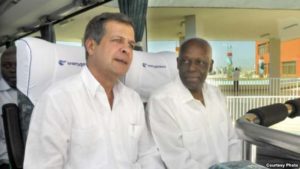 (OPINION) WITHOUT ANY SUPPORT IN THE “NEW CONSTITUTION” THE PROTAGONISM OF THE MILITARY COMPANIES IN CUBA.
(OPINION) WITHOUT ANY SUPPORT IN THE “NEW CONSTITUTION” THE PROTAGONISM OF THE MILITARY COMPANIES IN CUBA.
There is no doubt that the main economic actor in Cuba is the Revolutionary Armed Forces (FAR). Officially no data are disclosed, but some experts estimate that military companies already represent about 70% of the national economy. And occupy in a privileged, and even monopolistic, the most important and lucrative sectors, those that offer a very safe return.
However, after a brief analysis there is nothing in the new constitutional text that covers such a significant reality. Article 221 says: “The armed mission’s essential mission is to protect and maintain the independence and sovereignty of the State, its territorial integrity, its security and peace.” It does not even refer to its mission to interfere or assume leadership or participation. in the national economy, it is not even mentioned in the text as “economic actor”.
In Title II, referring to the economic fundamentals, there is nothing written about any role of the FAR in this regard. And in article 22 of that Title, where the different types of property are recognized, there is no place where military property fits over means of production and profit.
It can not be considered in subparagraph a), on the “socialist property of the whole people” because the representative is the State, which makes it through the Government, and although the FAR is a government ministry it was already clear in the Article 221 what is your mission, which in no way mentions the economy. And not in paragraph f), on the “ownership of institutions”, because it clarifies that they have a non-profit purpose.
Apparently while drafting the new Constitution was intended to hide the leading role of the military in the Cuban economy. Perhaps because the US in recent times has intensified the economic embargo focused much more on military companies, to which it attributes the financial support of the regime and a dark focus of corruption and illegal appropriation of resources by the politico-military elite and his privileged offshoots. But in the eagerness to disguise they have left the main economic actor without legal support.
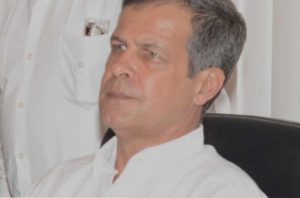
More than half of all economic activity in Cuba goes through GAESA’s Directorate with General Luis Alberto Rodriguez
The Cuban military controls through the GAESA Group the tourism sector with the company Gaviota S.A., the largest in Cuba and the one that has grown the most in recent years; covering sectors such as air and land transport for tourism, and almost the complete monopoly of the stores and chain stores collecting foreign currency through CIMEX. Likewise, with this last company they control the sale of fuel in all the service centers of the country.
But there are many other military companies with great prominence in the Cuban economy, as is the case of the Union of Military Constructions (UCM), which monopolizes the commissions of the most important and strategic works of the country, such as hotels for international tourism , the reservoirs and channels.
Recently, the Havanaguex business group led by Eusebio Leal, dedicated to the restoration and exploitation of the historical heritage of Old Havana, passed to GAESA control, as an evident demonstration of a trend towards the militarization of the Cuban economy.
However, the new constitution does not attribute such an economic role to the military institution, leaving a legal vacuum that places the hegemony of the military on the terrain of illegality. Although this does not constitute, of course, a problem for its functioning within the authoritarian system of the Communist Party.
Agencies/ DDC/ Osmel Ramirez, La Habana/ Internet Photos/ Arnoldo Varona/ www.TheCubanHistory.com
THE CUBAN HISTORY, HOLLYWOOD.



